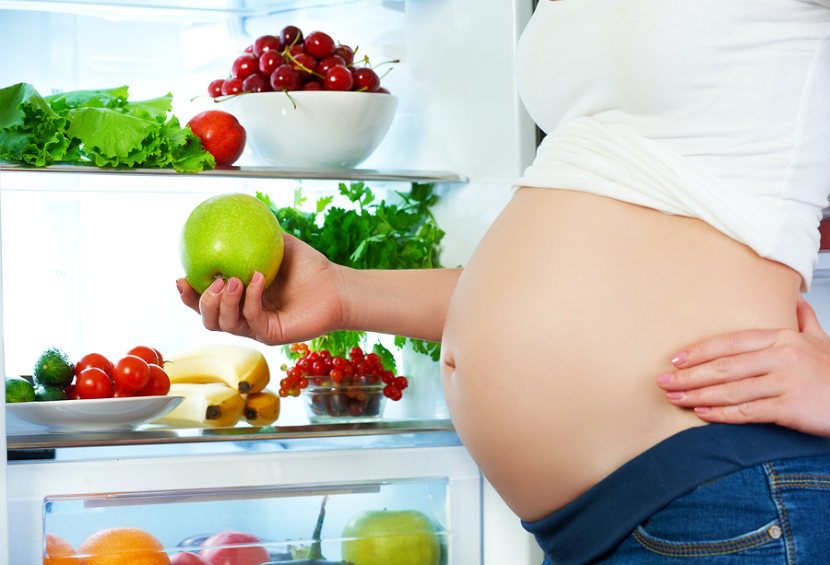
Food safety is important to everyone, but it is especially important while you are pregnant. The hormones in pregnancy change your immune system, making it easier for you to get a foodborne illness (food poisoning). Even if you don’t feel sick, the microorganisms that cause food-borne illness can cause serious harm to your baby.
Symptoms of foodborne illness
Symptoms of foodborne illnesses can range from mild to very serious. They may include:
-
Nausea
-
Vomiting
-
Diarrhea
-
Stomach cramps
-
Fever
You may feel sick right after eating a contaminated food or you may not feel sick until a few days or weeks later. In most cases, the symptoms don’t last very long. Often people don’t even realize they have a foodborne illness because it can feel like the flu. If you think you have a foodborne illness, report it to your doctor or health department.
Foods to avoid while you are pregnant
Avoid the following foods while you are pregnant:
-
Raw or unpasteurized dairy products (milk, yogurt, cheese)
-
Unpasteurized fruit juices or cider
-
Pasteurized and unpasteurized soft and semi-soft cheeses (e.g. Brie, Camembert, chèvre, feta), blue-veined cheeses (e.g. Danish blue, Roquefort, Gorgonzola) and Hispanic-style fresh cheeses (e.g. queso blanco, queso fresco, queso panela) unless they are cooked until steaming hot (internal temperature of 74°C)
-
Refrigerated pâtés, meat spreads and smoked seafood
-
Pre-packaged or prepared fruit/vegetable salads
-
Raw sprouts (e.g. alfalfa, clover, radish, mung bean)
-
Ready-to-eat deli meats and ready-prepared meals unless they are reheated until steaming hot (internal temperature of 74°C)
-
Raw or undercooked meat, poultry, seafood and eggs
General food safety tips
Use the tips below to help you follow safe food handling practices.
Wash your hands
Rub your hands together using soap and warm water for at least 20 seconds. Wash the skin between your fingers and the backs of your hands. Use a nailbrush around your nails. Dry your hands thoroughly, preferably with a single use towel.
Remember to wash your hands:
-
Before handling food
-
After handling raw meat, poultry and seafood
-
After using the washroom or changing diapers
-
After blowing your nose, coughing or sneezing
-
After touching pets
Cook foods to a safe internal temperature
Avoid cross contamination
-
Keep raw meat, fish, shellfish and poultry away from cooked foods. Use separate knives, utensils and cutting boards for handling raw foods and cooked foods.
-
Wash your hands with hot, soapy water for at least 20 seconds before and after handling raw meats, fish, shellfish, poultry and eggs.
-
Clean and sanitize all surfaces after handling food, especially raw foods. Use either:
-
A kitchen sanitizer (follow directions on bottle) or
-
A bleach solution (combine 5 mL/1 tsp of bleach with 750 mL/3 cups of water). Remember to rinse afterwards with water.
Keep hot food hot and cold food cold
-
Keep hot foods at 60°C or above. Keep cold foods at 4°C or below. Use a digital food thermometer to check the internal temperature.
-
Check that your refrigerator is set to 4°C or lower.
-
Refrigerate or freeze prepared foods and leftovers within two hours. Cool hot foods quickly in a shallow pan. Cover and refrigerate.
-
Keep leftovers in the refrigerator for no more than four days. When serving leftovers, reheat the food to an internal temperature of 74°C. Use a digital food thermometer to check the internal temperature.
Defrost food safely
-
Defrost frozen foods in the refrigerator, in cold water, or in the microwave. Never defrost food at room temperature.
Wash fruits and vegetables thoroughly
-
Wash fruits and vegetables under cool running water, even if you are planning on peeling them. You don’t need to buy produce cleaners.
-
Use a clean produce brush to scrub foods that have firm, rough surfaces like melons or potatoes.
-
Cut away any damaged or bruised areas.
Bottom line
Avoiding certain foods and using safe food handling while pregnant can protect you and your baby from foodborne illness. If you think you have a foodborne illness, report it to your doctor or health department.
You may also be interested in:
Food safety: Understanding foodborne illness
Keeping Your Baby Healthy During Pregnancy
Food Safety – True or False
Video: Everyday tips for washing vegetables and fruit
Last Update – February 7, 2019